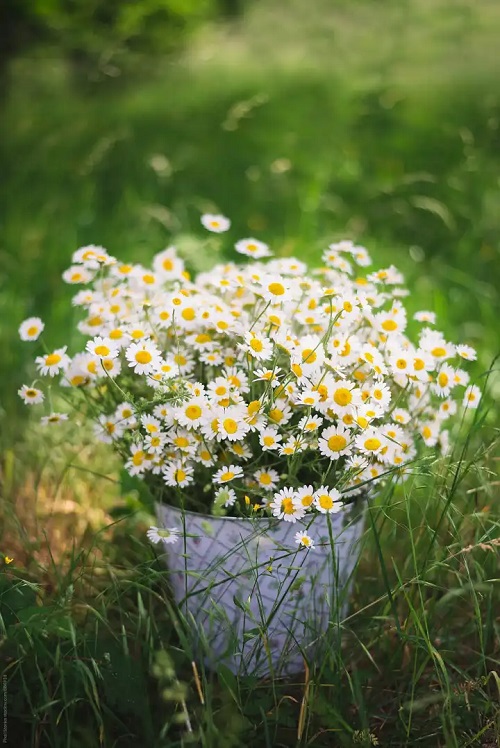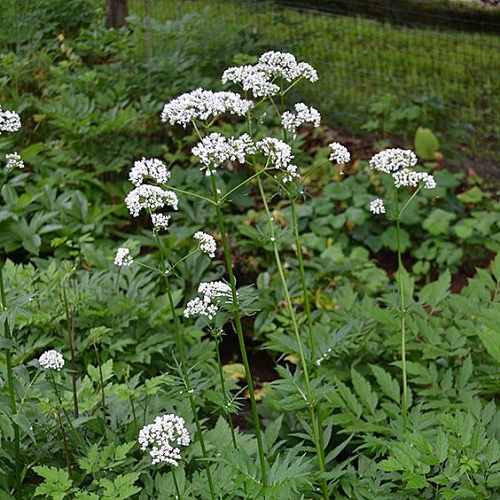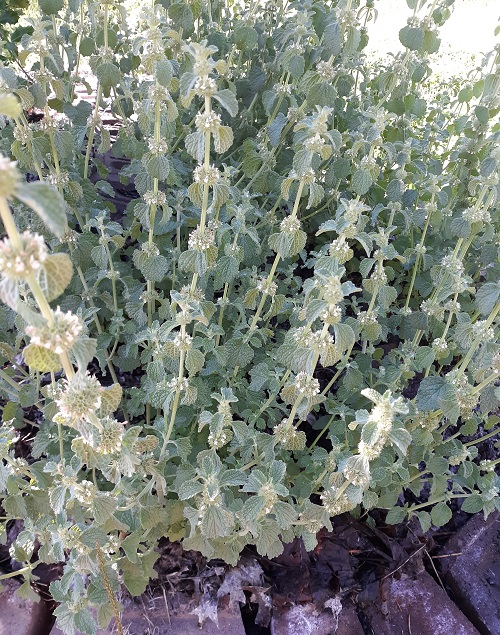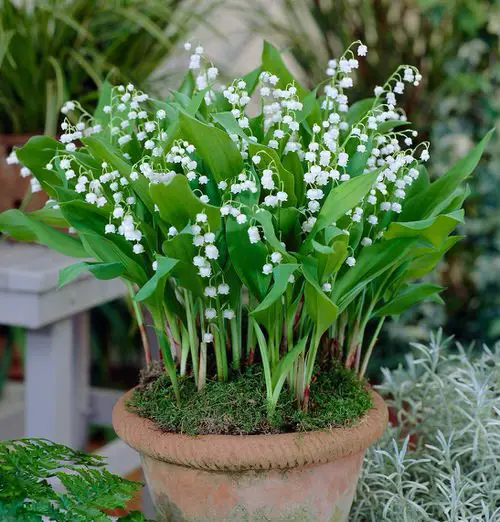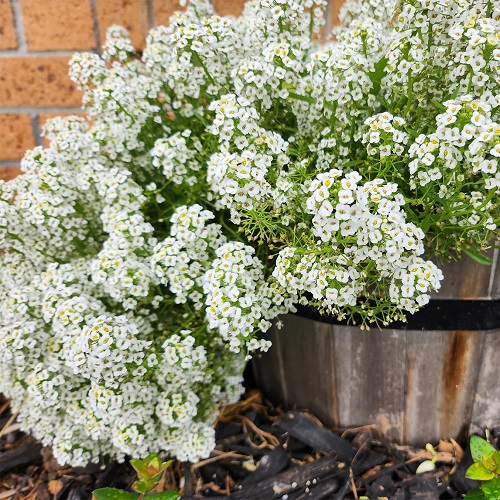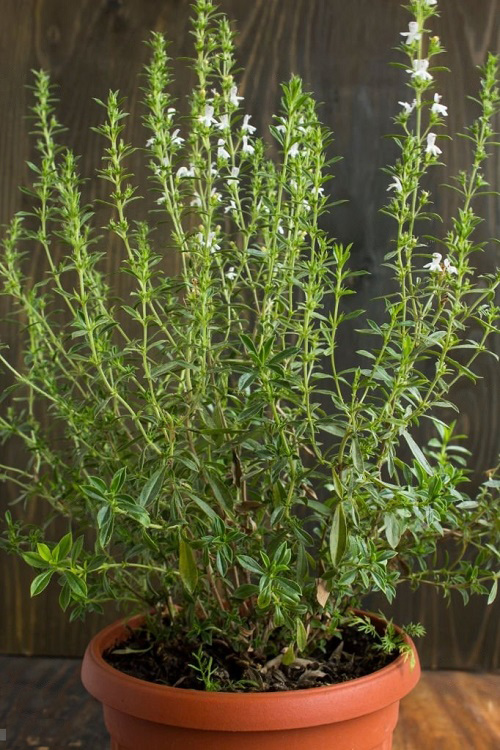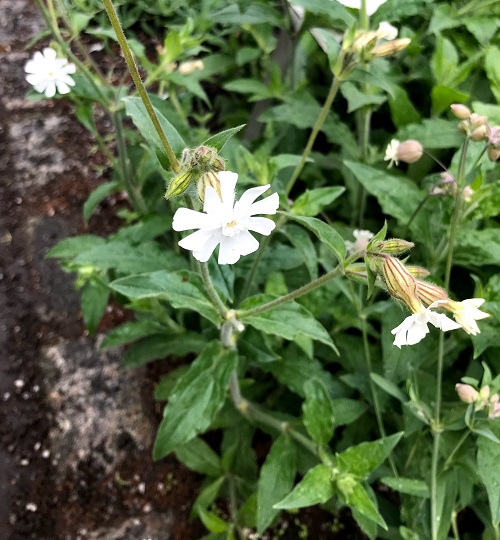Check out some beautiful Herbs with White Flowers that you can grow to have a touch of elegance in your home and garden.
Imagine walking in a calm garden, feeling peaceful and pure with every step. Herbs with White Flowers are like the key to this wonderful feeling! Join us on the journey as we uncover the hidden wonders of these herbs.
Herbs with White Flowers
1. Chamomile
Botanical Name: Matricaria recutita
Chamomile, native to Europe, are delicate Herbs with White Flowers with daisy-like blooms and vibrant yellow centres.
Uses:
- Digestive Aid: Reduces indigestion, bloating, and gastrointestinal discomfort.
- Anti-Inflammatory: Soothes skin irritations, rashes, and minor wounds.
- Menstrual Discomfort: Ease menstrual cramps and discomfort.
- Cold Remedy: Soothe cold symptoms like congestion and sore throat.
- Garden Benefits: Scare off pests and attracts beneficial insects.
2. Elderflower
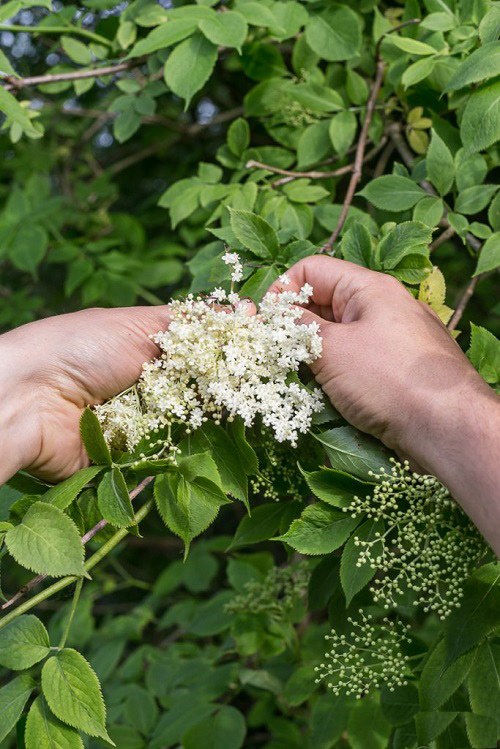
Botanical Name: Sambucus spp.
Elderflower is a captivating herb popular for its clusters of delicate, white blossoms that adorn its branches. This flowering plant has medicinal properties.
Uses:
- Teas and Infusions: They can be steeped in hot water to create soothing herbal teas and infusions.
- Respiratory Health: Often used in herbal remedies to support respiratory health, particularly for soothing coughs and congestion.
- Toner and Astringent: They are used as a natural facial toner to cleanse and tighten the skin.
3. Angelica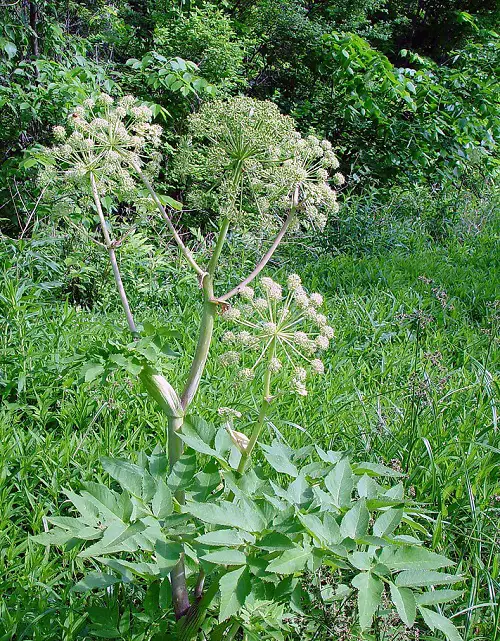
Botanical Name: Angelica archangelica
These Herbs with White Flowers have tall stalks with clusters of delicate blooms. It’s popular, both ornamentally and culinary.
Uses:
- Candied Angelica: The stems are often candied and used as a decorative element in cakes, pastries, and confections.
- Respiratory Support: Used as a remedy for respiratory issues, including coughs and bronchitis.
- Aromatherapy: Angelica essential oil is used in aromatherapy for its soothing effects on the mind and body.
- Protective Properties: They are believed to have protective and warding properties against evil spirits and illnesses.
4. Valerian
Botanical Name: Valeriana officinalis
Valerian is popular for its clusters of small, fragrant white flowers and holds a significant role in herbal medicine, with people having utilized it for its potential calming and sedative effects.
Uses:
- Sedative Properties: Often used to promote relaxation, reduce anxiety and improve sleep quality.
- Supplements: Valerian root is available in various forms, including capsules, teas, and tinctures, as a natural remedy for stress and sleep issues.
- Nervous System Support: Used to ease symptoms of nervous tension and stress.
- Wildlife Attraction: The flowers can attract pollinators like bees and butterflies.
Short on space? Here is How to Make a Balcony Herb Garden
5. White Horehound
Botanical Name: Marrubium vulgare
White horehound, recognized for its clusters of small, tubular white flowers and unique wrinkled leaves, is an herbaceous plant. Its history is firmly grounded in traditional medicine, where it has found application for various health-related objectives.
Uses:
- Respiratory Health: It has been traditionally used to soothe respiratory issues such as coughs, bronchitis, and congestion.
- Digestive Aid: Used to address digestive discomforts and stimulate appetite.
- Herbal Preparations: Still used in modern herbalism for its potential benefits, often as teas, tinctures, or capsules.
- Bittering Agent: It was used to add a bitter taste to alcoholic beverages before the introduction of hops.
6. Sweet Woodruff
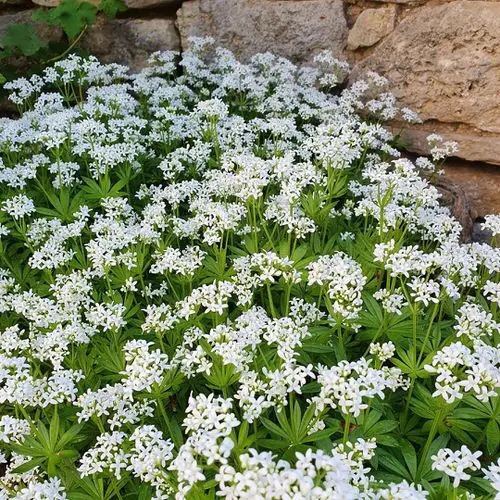
Botanical Name: Galium odoratum
These Herbs with White Flowers are native to Europe. This woodland plant has found its way into various aspects of culture, from culinary uses to traditional herbal remedies.
Uses:
- Flavorful Garnish: Used as a decorative and aromatic garnish in beverages, desserts, and salads.
- Digestive Aid: It has been used to ease digestive discomfort and stimulate appetite.
- Aromatherapy: Sweet woodruff’s fragrance is used in aromatherapy for relaxation and stress relief.
- Wildlife Habitat: Sweet woodruff provides a habitat for pollinators and other small wildlife in garden settings.
7. Lily of the Valley
Botanical Name: Convallaria majalis
Native to Europe, Lily of the Valley is a delicate and charming perennial herb with its bell-shaped, white, and fragrant flowers that hang gracefully from slender stems.
Uses:
- Natural Perfume: Used in perfumery to create light and fresh scents.
- Heart Health: Used to address heart-related discomforts, although its medicinal use requires caution due to potential toxicity.
- Garden Elegance: Popular choice for shaded gardens and adds a touch of elegance with its lovely blooms and lush green foliage.
8. Yerba Buena
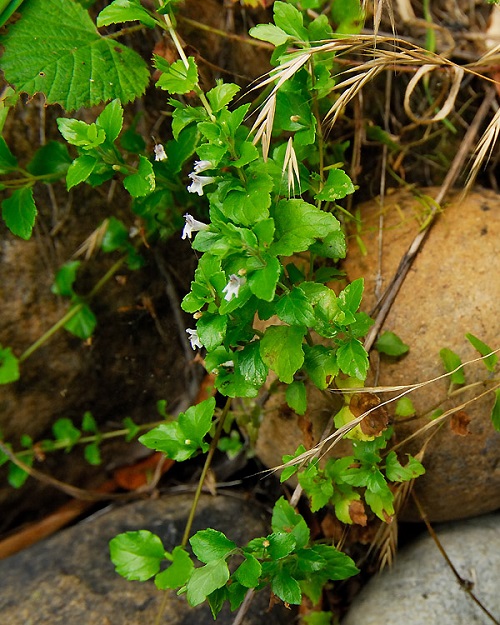
Botanical Name: Clinopodium douglasii
Yerba Buena is one of the aromatic Herbs with White Flowers native to North America, particularly the western United States. With its bright green leaves and small white flowers, Yerba Buena has been valued for its culinary, medicinal, and cultural uses.
Uses:
- Herbal Tea: Used to make herbal teas with a refreshing minty flavor.
- Traditional Medicine: Used in traditional herbal medicine for its potential to soothe digestive discomfort, headaches, and respiratory issues.
- Aromatic Herb: Yerba Buena’s pleasant minty aroma makes it popular for aromatherapy and fragrant applications.
- Habitat for Wildlife: Provide habitat and food for wildlife, including pollinators.
9. Sweet Alyssum
Botanical Name: Lobularia maritima
Native to the Mediterranean region, these Herbs with White Flowers are known for its tiny, fragrant flowers that create a carpet of color. It has become a popular choice in gardens and landscapes around the world.
Uses:
- Ground Cover: Used as a ground cover in gardens, adding a carpet of delicate blooms and a sweet fragrance.
- Aromatherapy: Its gentle scent makes it a favorite for those seeking subtle aromatherapy in outdoor spaces.
- Beneficial Insects: Attracts beneficial insects, such as hoverflies, which can help control garden pests.
- Soil Protection: Sweet Alyssum’s low-growing habit helps protect soil from erosion and conserves moisture.
10. Summer Savory
Botanical Name: Satureja hortensis
Summer savory, a fragrant herb renowned for its culinary applications and aromatic leaves, originates from the Mediterranean region. This annual herb holds value for its capacity to infuse dishes with flavor and its historical importance in traditional medicine.
Uses:
- Flavor Enhancer: Used as a culinary herb to add a peppery and slightly spicy flavor to various dishes.
- Seasoning: Used to season beans, soups, stews, and meat dishes, particularly in Mediterranean and European cuisines.
- Traditional Remedy: Used as a digestive aid to reduce indigestion and bloating.
- Companion Planting: Used as a companion plant to scare off pests, particularly bean beetles.
Check out Herbs that Like Full Sun and Heat here
11. Pearly Everlasting
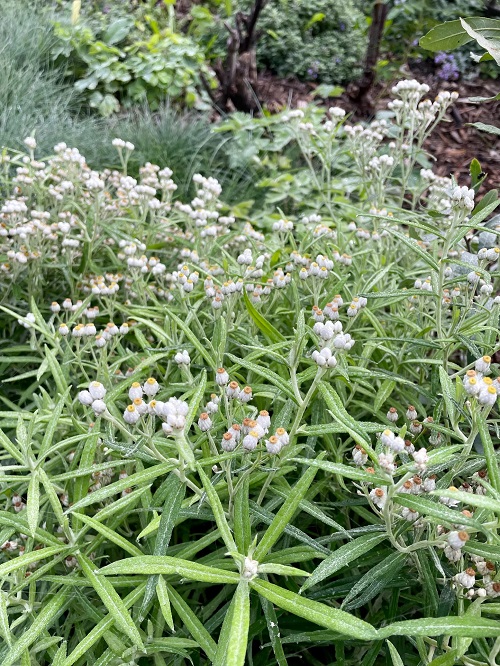
Botanical Name: Anaphalis margaritacea
Native to North America, Pearly Everlasting is a captivating herbaceous perennial known for its clusters of small, white, papery flowers that retain their beauty even when dried.
Uses:
- Traditional Medicine: Historically, Native American tribes used parts of the plant for medicinal purposes, such as poultices and teas.
- Wildlife Habitat: The plant provides a habitat for various insects and can attract pollinators to gardens.
- Cultivating Native Plants: Its use in gardens aligns with the growing interest in using native plants for landscaping and ecological benefits.
12. Sweet Cicely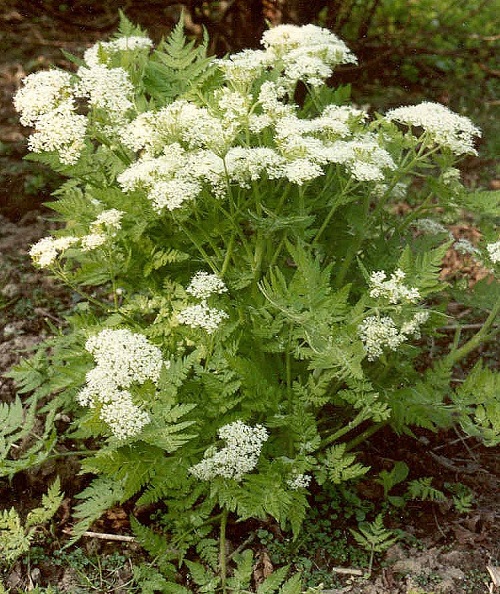
Botanical Name: Myrrhis odorata
These Herbs with White Flowers have fern-like leaves. Native to Europe and Asia, it has found its place in both culinary and medicinal traditions, offering a range of flavors and potential health benefits.
Uses:
- Desserts and Beverages: Used in desserts, jams, and beverages, imparting a mild, aromatic sweetness.
- Traditional Medicine: Used in traditional herbal medicine for its potential digestive and respiratory benefits.
- Expectorant: Helps relieve coughs and ease respiratory discomfort.
- Wildlife Attraction: The flowers provide nectar for pollinators and contribute to biodiversity.
13. White Campion
Botanical Name: Silene latifolia
Native to Europe, White Campion is popular for its delicate white flowers and distinctive seed pods. With its ornamental beauty and ecological role, these Herbs with White Flowers have made its mark in both natural landscapes and human culture.
Uses:
- Historical Uses: Used in traditional herbal medicine for various ailments, though its use has declined over time.
- Potential Benefits: It has diuretic and anti-inflammatory properties, among other potential uses.
- Edible Leaves: Young leaves of White Campion are edible and can be used in salads or cooked as a leafy green vegetable.
- Wildlife Support: The flowers provide nectar for pollinators, while the seeds are consumed by birds and small mammals.
14. White Dead Nettle
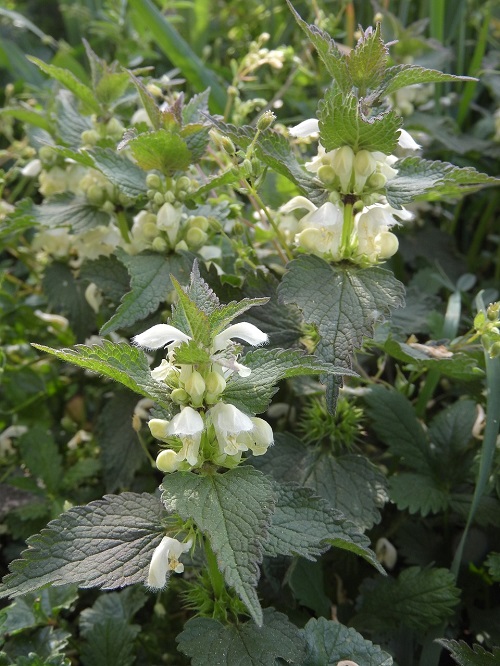
Botanical Name: Lamium album
White Dead Nettle is a delicate perennial herb that graces gardens, meadows, and fields across Europe and beyond. It stands out with its square stems, heart-shaped leaves, and clusters of white flowers.
Uses:
- Edible Leaves: Young leaves can be consumed in salads or cooked as a mild, earthy-flavored green vegetable.
- Soil Improvement: Contributes to improving soil health and offers soil protection and helps prevent soil erosion.
- Astringent: Used to tighten and tone tissues, potentially aiding in the treatment of minor cuts, bruises, or superficial skin conditions.
- Digestive Aid: Used as a mild digestive aid, potentially aiding in reducing gastrointestinal discomfort.
15. White Clover
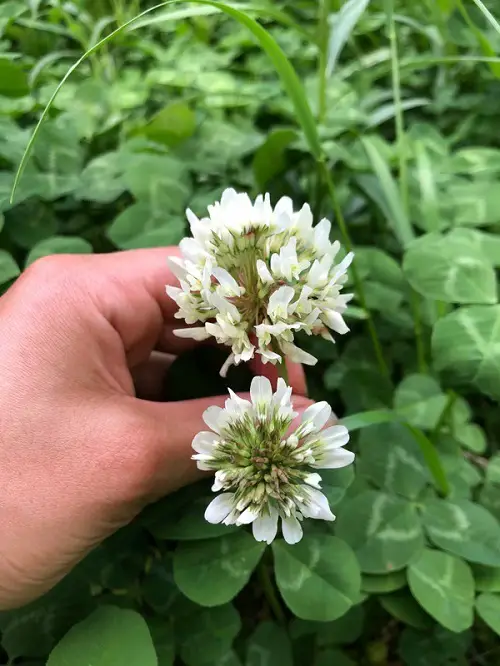
Botanical Name: Trifolium repens
Native to Europe, these Herbs with White Flowers hold both practical and ecological significance, making its presence felt across diverse landscapes.
Uses:
- Nitrogen Fixation: White Clover’s root system hosts nitrogen-fixing bacteria, contributing to soil enrichment by converting atmospheric nitrogen into a usable form.
- Cover Crop: Utilized as a cover crop to protect against soil erosion and suppress weed growth in agricultural settings.
- Forage: A valuable source of nutritious forage for livestock, commonly found in pastures and grazing lands.
- Honey Production: The fragrant flowers serve as a nectar source for bees, supporting honey production and pollinator health.


